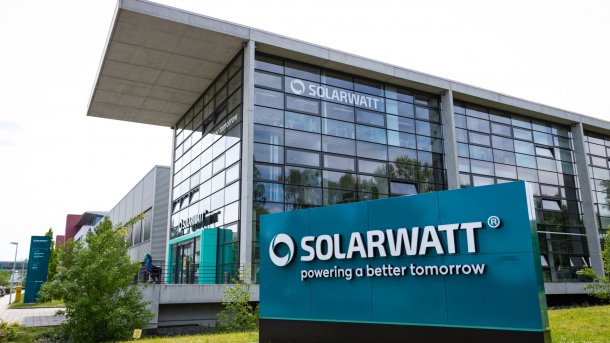Solarwatt: New strategy after withdrawal from module production
Difficult market environment: Solarwatt says goodbye to domestic production for good and realigns itself.

(Image: Solarwatt)
Solarwatt is realigning itself and wants to finally become a full-service provider for private power generation, e-mobility and heating. The company announced this at a press conference. However, it is saying goodbye to local production. Under the current conditions, it is not possible to produce economically in Europe. The price pressure from China is too high. As a consequence, the Dresden plant already ceased module production in the course of the year. Solarwatt will also cease production of battery storage systems in Dresden at the end of 2024.
Solarwatt now has its modules and battery storage systems produced exclusively by contract manufacturers in Asia under its own name. This also applies to inverters.
As part of the restructuring, the company is also making massive job cuts. By 2025 at the latest, only 350 of the 850 employees will be left. Solarwatt justifies half of the 500 redundancies with the plant closures. However, further jobs will be lost in all areas of the company.
(Image: Solarwatt)
No more 1Komma5°
In future, Solarwatt will offer PV systems including battery storage and inverters, wallboxes, heat pumps and an energy manager designed to optimize generation and consumption from a single source under the "Solarwatt Home" brand. The company is entering into partnerships for this purpose. It is working with Stiebel Eltron on heat pumps and with Kiwi Grid on energy management.
Solarwatt does not intend to offer its own electricity tariffs. However, this is now a trend in the PV market. Companies such as 1KOMMA5° or Enpal are enticing customers with low-cost electricity tariffs of 12 cents per kilowatt hour. Consumer advocates criticize such providers because the cost and contract conditions are difficult to understand.
Videos by heise
Difficult market
The photovoltaic industry in Germany has been under economic pressure for some time due to cheap hardware from the Far East. This has recently been made particularly clear by developments at Meyer Burger, Europe's largest solar manufacturer. Back in spring, the company closed what it claimed was Europe's largest solar module production facility in Freiberg, Saxony. In September, it was announced that the previous Managing Director Gunter Erfurt would be stepping down and that a further 200 jobs would be lost, particularly in Europe.
However, smaller companies have also made headlines in recent weeks with redundancies and insolvencies. These include the installation company Wegatech with around 200 employees. The figures now presented by Solarwatt also show that demand for PV systems with a peak output of up to 30 kilowatts in particular plummeted last year. The industry's business climate index is therefore at its lowest level for 10 years.
Industry experts do not consider this development to be surprising. For example, the managing director of the industry association BSW-Solar told pv-magazine.de: "One explanation for the clouding of the business situation, which is felt particularly strongly by some companies in the home segment, is probably related to the fact that, according to reports, up to 5,000 new installation companies have entered the domestic photovoltaic market in the last two or three years." If the market stagnates with more competitors, this will inevitably lead to declining sales for individual companies. Falling market prices are exacerbating the situation.
(ssi)